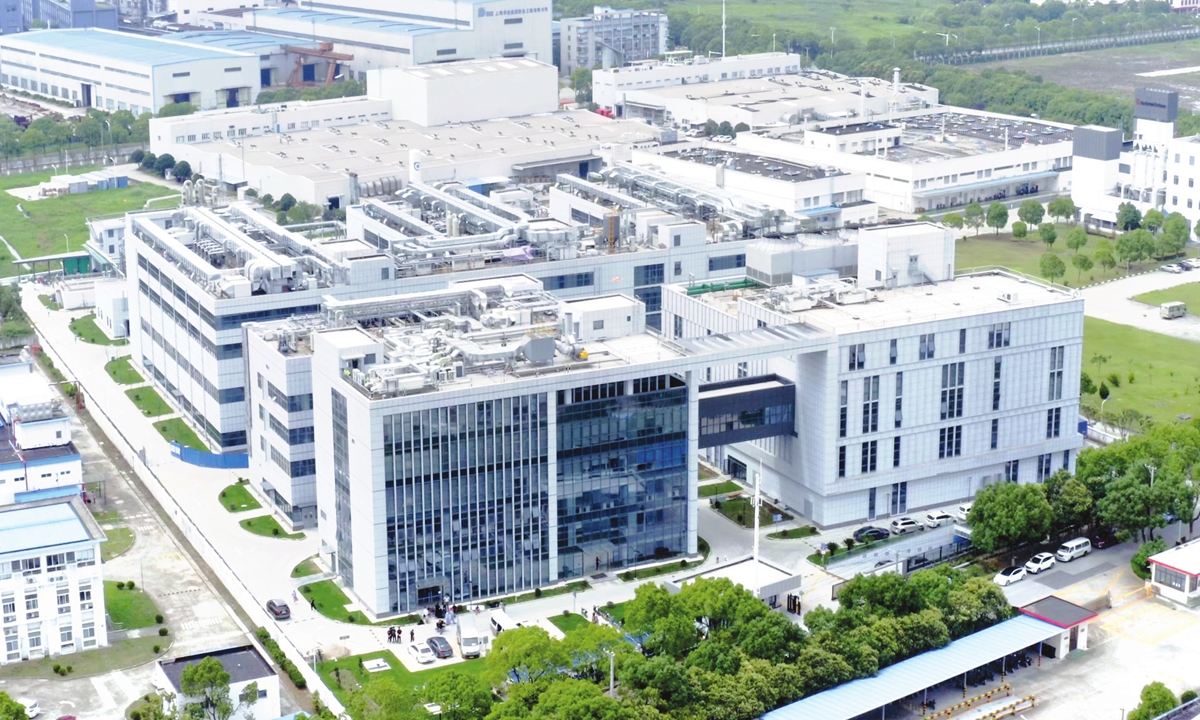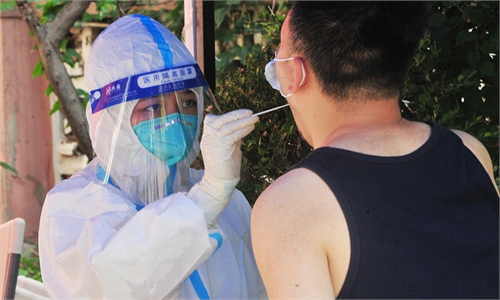
Hongene Biotech Corporation's new plant in Shanghai Hangzhou Bay Economic & Technological Development Park Photo: Courtesy of Hongene Biotech
Shanghai's first nucleic acid industrial park will start construction in the Shanghai Hangzhou Bay Economic & Technological Development Park (SHBAY) in the middle of July, with a planned area of three square kilometers, aiming to take a preemptive step in developing China's biomedicine industry in a post-pandemic era.
A 720-mu (48 hectares) pilot area will be built for the nucleic acid industries during the early phase of the project, according to media reports.
The SHBAY has already attracted some industrial frontrunners in nucleic acid drug development sector, including Hongene Biotech Corporation, Shanghai BiOligo Biotech Co and Shanghai Pharmaceuticals Holding Co.
Besides the development of nucleic acid drug, the industrial park also plans to invest 1.8 billion yuan ($270 million) to build a 120-mu scale of nucleic acid industry technology center with 11 R&D buildings, providing ample space for nucleic acid biomedical research and development enterprises.
The news also raised questions among netizens on social media platforms on whether the setup of the new industrial park is a response to the recent Omicron flare-ups in China. "It is a biopharmaceutical industry mainly developing various vaccines and drug based on RNA, which is the direction of future development for the biopharmaceutical industry and has nothing to do with the flare-ups," according to a statement released on the official Wechat account of the government of Shanghai's Fengxian district, where the park is located.
According to medical information website News Medical, "nucleic acids are essential for all forms of life, and it is found in all cells. Nucleic acids come in two natural forms called deoxyribonucleic acid (DNA) and ribonucleic acid (RNA)."
The nucleic acid testing used in COVID-19 is detecting the RNA component of the virus; while in the biomedical field, the messenger RNA (mRNA) is a pharmaceutical innovation technology, which would help break through the limitations of cancer, infectious diseases and other treatment programs, reports said, noting that the development of COVID-19 related products is only one part within the nucleic acid industry ecosystem.
The biomedicine industry is an important pillar of Shanghai's strategic emerging industries and one of the three leading industries in the city.
The establishment of industrial parks could help improve the development of the overall industrial chain, industrial observers said.
Nucleic acid testing for the novel coronavirus in China has become highly efficient with lower cost, based on which if a joint test kit could be developed to test the novel coronavirus and other respiratory infections, representing great progress for the prevention and control of infectious diseases in China, they said.
Emerging industries
As a leading enterprise in the nucleic acid industry ecosystem of the development park, the Hongene Biotech set up a new plant in the park as early as in 2019 which was put into production in June 2021. Currently, Hongene produces 70 percent of the nucleic acid raw materials in the world with an annual output value of 1.5 billion yuan.
"Our businesses range from nucleic acid raw materials producing to nucleic acid drug development," Cai Kun, director of the pharmaceuticals division of Hongene Biotech, told the Global Times on Monday.
In addition to the prophylaxis and treatment of novel coronavirus infections, nucleic acid drug have a wide application in treating cancer and other infectious diseases, Cai said, noting that nucleic acid testing products were not among the company's line of businesses.
Hongene's 2.5-billion-yuan worth of nucleic acid drug R&D and production base has started construction as well in the industrial park, according to Cai.
With a total planned investment of 10 billion yuan, the industrial park will see an estimated annual output of 10 billion yuan and enterprises in the park are expected to pay taxes equal to 100 million to 150 million yuan annually after the park is put into operation in 2023, domestic news site stcn.com reported on Tuesday.
Since the outbreak of the COVID-19 pandemic, the pharmaceutical industry within the SHBAY has maintained rapid growth. There are more than 20 large-scale biomedical enterprises located in the park, with an annual output value of 6.42 billion yuan in 2021, an increase of 23 percent compared with 2020, according to the report.
Along with China's prevention against the novel coronavirus, there has emerged huge demand for related products and technologies, Cong Yi, a professor at Tianjin University of Finance and Economics, told the Global Times.
Moreover, these innovations are in line with the future development trend of the biopharmaceutical area, and it is advisable for cities and regions to take a preemptive step to build a sounder and independent industrial chain, Cong said.
Ahead of the new industrial park in Shanghai, a nucleic acid testing industrial cluster was also set up in a biomedical industrial park in Suzhou, East China's Jiangsu Province, as early as in last September. It has attracted nearly 100 companies with businesses ranging from those that supply raw material, and those engage in vitro diagnosis to medical tests, according to a statement released on a local government website. Jiangsu's Wuxi city also has put a nucleic acid testing base into operation in May which could complete test for 1.2 million people in mixed testing approach.
Besides the nucleic acid industries, epidemic prevention in China has also boosted the innovation of new technologies, such as the implementation of artificial intelligence, big data analysis, and others. Massive technology innovation will further drive the economic growth in the post-COVID era, according to Cong.
Shanghai University recently invented an automatic nucleic acid sampling robot, with highly improved sampling efficiency of as fast as 22 seconds per case, according to a statement released by the university.

